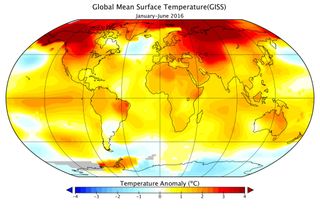Could Climate Change Affect People’s Personalities?

People's personalities may be shaped by the temperatures of the places in which they grew up, a new study suggests. This could mean that as climate change influences temperatures around the globe, shifts in personality may follow.
The idea that someone's personality may be affected by where that person lives is not new: Previous research has suggested that many aspects of human personality vary from one geographical region to another, according to the new study. But the causes of these personality differences have remained unclear.
One potential explanation is temperature, according to senior author Lei Wang, a social and cultural psychologist at Peking University in Beijing, and his colleagues. Because temperatures vary markedly across the world, the study authors reasoned that this factor might shape personality by influencing people's habits. For instance, temperature might have an impact on whether people like exploring their surroundings, interacting with others, trying new activities or engaging in collective outdoor work such as farming. [7 Thoughts That Are Bad for You]
But instead of simply looking at whether people grew up in hot or cold climates, the researchers took a more nuanced approach, looking at whether people grew up in milder climates, where temperatures are closer to about 71 degrees Fahrenheit (22 degrees Celsius), or if they lived in places with more extreme temperatures.
In the new paper, the researchers conducted two separate studies within two large, yet culturally distinct countries — China and the United States. By looking at data from these two countries, the researchers hoped to eliminate confounding effects from other factors — such as cultural or economic differences —that might also have influenced the subjects' personality.
The scientists analyzed data from more than 5,500 people from 59 Chinese cities and data from about 1.66 million people from about 12,500 ZIP codes in the United States. They examined data from personality questionnaires as well as the average temperatures of places where those people grew up.
The scientists discovered that the people who grew up in climates with milder temperatures were generally more agreeable, conscientious, emotionally stable, extroverted and open to new experiences. These findings held true for people in both countries, despite gender, age and average income.
Sign up for the Live Science daily newsletter now
Get the world’s most fascinating discoveries delivered straight to your inbox.
It's possible that mild temperatures can influence personality by encouraging social interactions and supporting a wider range of activities, the researchers said.
These new findings do not suggest that climate was the sole factor that shaped a person's destiny, said Evert Van de Vliert, a cross-cultural psychologist at the University of Groningen in the Netherlands, who was not involved in the new study.
"I would caution … against thinking that our ancestors, and we ourselves of course, are passive products of where we live," Van de Vliert told Live Science. "By intelligently and actively using property and money, humans can and do create their own identity and destiny in harsher climates."
Indeed, the study found that despite living in climates that are similarly harsh, people in certain Chinese regions differ, personality-wise, from people living in northern states in the U.S., suggesting that other factors aside from temperature play a role, Van de Vliert said. [5 Ways Climate Change Will Affect Your Health]
For example, in China, where people are relatively poor compared with those living in the United States, those "who live in the harsher climates of Heilongjiang, Xinjiang and Shandong have a more collectivist personality than their compatriots living in the more temperate climates of Sichuan, Guangdong and Fujian," Van de Vliert said.
In contrast, in the United States, those "who live in the harsher climates of North and South Dakota, Montana and Minnesota have a more individualist personality than their compatriots in the more temperate climates of Hawaii, Louisiana, California and Florida," he said.
Van de Vliert noted that questions about potential links between personality and geographical regions have often led to controversy. For example, by suggesting that climate essentially controls a person's destiny, some researchers "have put forward self-serving claims about the intellectual superiority of some races and the inferiority of others," he said. Such claims have led others to avoid "research into climatic influences on people," he said.
The authors of the study said that more research is still needed to understand the potential effects of temperature on personality. However, the researchers noted that "as climate change continues across the world, we may also observe [associated] changes in human personality. Of course, questions about the size and extent of these changes await future investigation."
The scientists detailed their findings online Nov. 27 in the journal Nature Human Behavior.
Originally published on Live Science.

Most Popular


